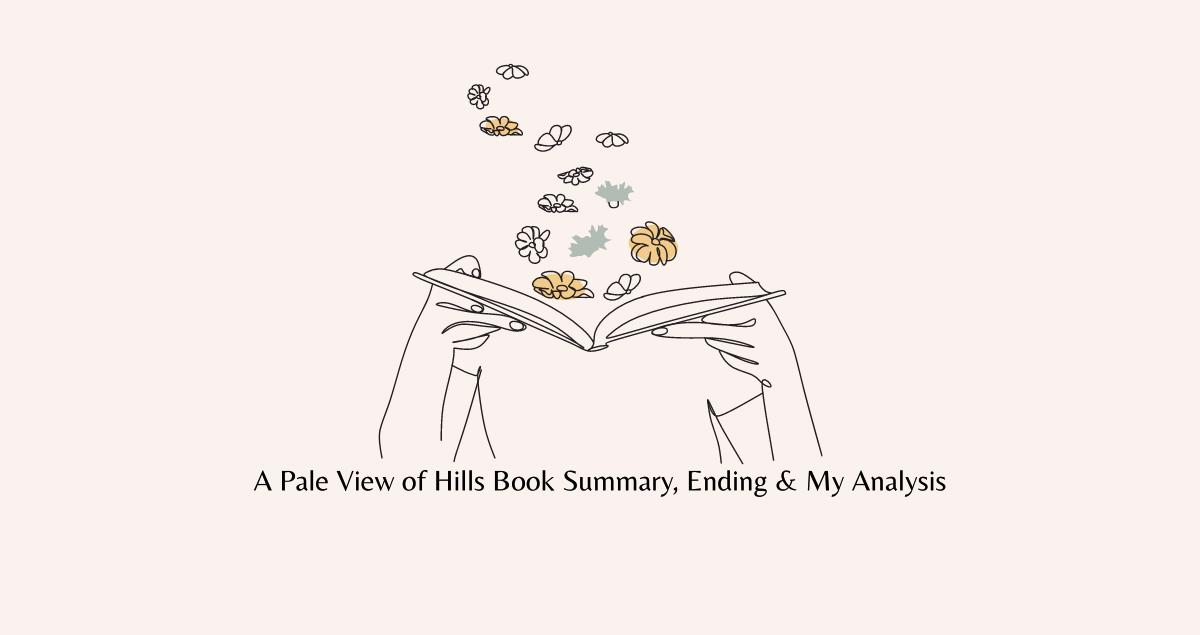A Pale View Of Hills is about a Japanese woman named Etsuko who reflects on her life in post-war Nagasaki and her experiences in England. She grapples with memories of her first daughter, who took her own life, and her second daughter, Niki. Through her recollections, the book delves into themes of motherhood, loss, and the impact of cultural change.
Table of Content
A Pale View Of Hills Book Summary
Etsuko, a Japanese woman living in England, reflects on her past in post-war Nagasaki and its effect on her current life. She grapples with the memories of her first daughter, Keiko, who committed suicide, and the strained relationship with her second daughter, Niki.
She recalls her friendship with Sachiko in Nagasaki, and the troubled relationship between Sachiko's daughter, Mariko, and her ex-husband. Etsuko confronts the difficulties of motherhood and the choices that shaped her life.
After meeting a mysterious woman, Ogata-San, in England, Etsuko is reminded of the painful past. She is forced to reevaluate her memories, particularly those of Keiko and the impact of the war on their lives.
Etsuko's recollections are complex and often ambiguous, blurring the line between reality and imagination. She contemplates cultural differences and the loss of traditions in her homeland.
As Etsuko's memories unfold, the narrative shifts between Nagasaki and England, revealing the dissonance between her two worlds. The countryside of Nagasaki is juxtaposed with the urban landscape of England, reflecting Etsuko's sense of displacement.
She considers her first marriage to Jiro and the community she left behind in Japan. Each memory is tinged with nostalgia and regret, illuminating the deep psychological impact of loss and change.
Through her conversations with Ogata-San, Etsuko is compelled to revisit a specific event from her past, where she may have unknowingly influenced Keiko's decision to end her life.
The story's ambiguity creates a sense of unease, as Etsuko's recollections become more fragmented and difficult to distinguish from reality.
Etsuko's relationship with Niki further reflects her own internal conflict, as Niki criticizes her mother's choices and the family's past. This prompts Etsuko to question her own identity and the validity of her memories.
In the book's climactic moments, Etsuko is confronted with the possibility that her memories have been distorted by grief and guilt. This realization challenges the narrative's reliability and the nature of truth itself.
The story concludes with Etsuko back in England, but the impact of her reflections on her past in Nagasaki continues to haunt her. The novel's conclusion underscores the enduring influence of memory and the complexities of personal history.
A Pale View Of Hills is a powerful exploration of identity and loss. It delves into the psychological nuances of memory and the enduring impact of the past on the present.
A Pale View Of Hills Quotes
- It is always our own self that we find at the end of the journey. The sooner we face that self, the better.

- Memory is a funny thing. When I was in Nagasaki, I used to forget my way home. Now I forget my way around the house.

A Pale View Of Hills Ending Explained
At the end of A Pale View Of Hills, Etsuko finds herself deeply affected by her recollections of Nagasaki and the choices she made that led to her daughter Keiko's tragic death.
She is troubled by the possibility that her memories may be flawed or influenced by her own interpretation of past events. This revelation adds a layer of uncertainty to her narrative, leaving readers to question the reliability of Etsuko's recollections.
The novel concludes with Etsuko returning to her life in England, where she continues to grapple with the emotional and psychological impact of her past, highlighting the enduring nature of memory and its significance in shaping one's identity.
Characters in book A Pale View Of Hills
- Etsuko: The protagonist, a Japanese woman who has lived in England and reflects on her past in Nagasaki and the loss of her daughter.
- Keiko: Etsuko's first daughter, whose death has a profound impact on her mother's memories and emotions.
- Nikki: Etsuko's second daughter, with whom she has a complex relationship, and who is critical of Etsuko's past and her current life in England.
- Jiro: Etsuko's second husband, a Japanese man with whom she had a brief marriage after moving to England.
- Sachiko: A friend of Etsuko's in Nagasaki, with whom she discusses motherhood and the war's effects on their lives.
- Mariko: Sachiko's daughter, a young girl who becomes entangled in a complex family situation.
- Ogata-San: A mysterious woman with a shadowy past who befriends Etsuko in England and prompts her to revisit her memories of Nagasaki.
Key Lessons
- Embrace Change: Change is inevitable, and adapting to new circumstances can lead to personal growth and resilience.
- Reflect on the Past: Examining one's past can provide valuable insights into the present and lead to a deeper understanding of oneself.
- Question Memory: Memories are subjective and can be influenced by emotions and personal biases. It is essential to critically assess the accuracy of one's recollections.
- Value Relationships: The quality of relationships with others can shape your perspective on life and influence your emotional well-being.
- Understand Cultural Differences: Cultural variations can have a profound impact on how individuals perceive and respond to the world around them.
My Personal Opinion
Is A Pale View Of Hills worth reading? Yes, I found it to be a thought-provoking and beautifully written narrative that masterfully examines the intricacies of memory and loss.
I was captivated by the novel's exploration of cultural dislocation and the impact of the past on the present. However, the story's ambiguity can be disorienting at times, and some readers may find the lack of concrete resolution unsatisfying.
I would recommend this book to those who appreciate contemplative literature and are interested in the psychological depth of character exploration. It particularly resonates with individuals who have experienced the complexities of living between different cultures.

